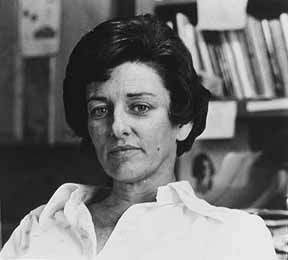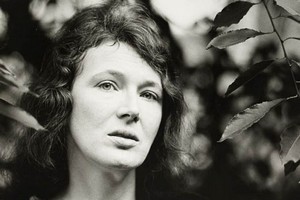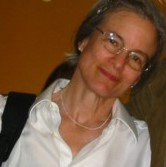
Anne Sexton was an American poet known for her highly personal, confessional verse. She won the Pulitzer Prize for poetry in 1967 for her book Live or Die. Her poetry details her long battle with bipolar disorder, suicidal tendencies, and intimate details from her private life, including relationships with her husband and children, whom it was later alleged she physically and sexually assaulted.

Angela Olive Pearce, who published under the name Angela Carter, was an English novelist, short story writer, poet, and journalist, known for her feminist, magical realism, and picaresque works. She is mainly known for her book The Bloody Chamber (1979). In 1984, her short story "The Company of Wolves" was adapted into a film of the same name. In 2008, The Times ranked Carter tenth in their list of "The 50 greatest British writers since 1945". In 2012, Nights at the Circus was selected as the best ever winner of the James Tait Black Memorial Prize.

Muriel Rukeyser was an American poet, essayist, biographer, novelist, screenwriter and political activist. She wrote across genres and forms, addressing issues related to racial, gender and class justice, war and war crimes, Jewish culture and diaspora, American history, politics, and culture. Kenneth Rexroth said that she was the greatest poet of her "exact generation," Anne Sexton famously described her as "mother of us all", while Adrienne Rich wrote that she was “our twentieth-century Coleridge; our Neruda."

Alicia Suskin Ostriker is an American poet and scholar who writes Jewish feminist poetry. She was called "America's most fiercely honest poet" by Progressive. Additionally, she was one of the first women poets in America to write and publish poems discussing the topic of motherhood. In 2015, she was elected a Chancellor of the Academy of American Poets. In 2018, she was named the New York State Poet Laureate.

Sharon Olds is an American poet. Olds won the first San Francisco Poetry Center Award in 1980, the 1984 National Book Critics Circle Award, and the 2013 Pulitzer Prize for Poetry. She teaches creative writing at New York University and is a previous director of the Creative Writing Program at NYU.
Fairytale fantasy is distinguished from other subgenres of fantasy by the works' heavy use of motifs, and often plots, from folklore.
Jean Jay Macpherson was a Canadian lyric poet and scholar. The Encyclopædia Britannica calls her "a member of 'the mythopoeic school of poetry,' who expressed serious religious and philosophical themes in symbolic verse that was often lyrical or comic."
Diane Helen Middlebrook was an American biographer, poet, and teacher. She taught feminist studies for many years at Stanford University. She wrote critically acclaimed biographies of poets Anne Sexton and Sylvia Plath, and jazz musician Billy Tipton.

Jewish literature includes works written by Jews on Jewish themes, literary works written in Jewish languages on various themes, and literary works in any language written by Jewish writers. Ancient Jewish literature includes Biblical literature and rabbinic literature. Medieval Jewish literature includes not only rabbinic literature but also ethical literature, philosophical literature, mystical literature, various other forms of prose including history and fiction, and various forms of poetry of both religious and secular varieties. The production of Jewish literature has flowered with the modern emergence of secular Jewish culture. Modern Jewish literature has included Yiddish literature, Judeo-Tat literature, Ladino literature, Hebrew literature, and Jewish American literature.

Dragana Kršenković Brković is a Montenegrin writer.
Suniti Namjoshi is a poet and a fabulist. She grew up in India, worked in Canada and at present lives in the southwest of England with English writer Gillian Hanscombe. Her work is playful, inventive and often challenges prejudices such as racism, sexism, and homophobia. She has written many collections of fables and poetry, several novels, and more than a dozen children's books. Her work has been translated into several languages, including Spanish, Italian, Dutch, Chinese, Korean, Hindi and Turkish.
French folklore encompasses the fables, folklore, fairy tales and legends of the French people.
Zhai Yongming is a Chinese poet, essayist and screenwriter from Chengdu, in the southwest Sichuan Province. Born during the Maoist era, Zhai was forcibly sent away for two years to do manual labor in the countryside as part of the Cultural Revolution, eventually returning to Chengdu to work as a poet. Her poems began getting published in 1981, but her rise to critical acclaim came with the release of her poem cycle 'Woman', featuring one of the first instances of a socially-aware woman expressing her societal perspectives in Chinese literature. She has been marked by scholars as a foundational Chinese feminist poet, being the first to explore elements of gender and feminine identity beyond the scope of the male-oriented gaze; 'Woman' has even been appointed as the starting point for the subsequent 'Black Tornado' era of confessional Chinese women writers. Among her most notable works include poetry works are 'Jing'an Village (1985),' 'Plain Songs in the Dark Night (1997),' 'Collected Poems by Zhai Yongming (1994),' 'The Most Tactful Words (2009),' and 'Roaming the Fuchun Mountains with Huang Gongwang (2015).'
Susan Sellers is a British author, translator, editor and novelist. She was the first woman to be made a professor in the field of English literature as well as creative writing at the University of St Andrews, and is co-General Editor of the Cambridge University Press edition of the writings of Virginia Woolf.
Stealing the Language: The Emergence of Women's Poetry in America by Alicia Suskin Ostriker is a comprehensive review, published in 1986, of women's poetry which shaped the feminist movement after the 1960s. The critical work illustrates a struggle that women poets faced in their road to self-expression. Ostriker, who received her literary education in the 1950s and 1960s, seldom encountered women poets. Poetry was dominated by male writers and critics. Males claimed universality in the literary language, recognizing the woman writer as the "other." The gender bias is evident even in the criticism of women poets. Ostriker says that "the language used to express literary admiration in general presumes the masculinity of the author, the work, and the act of creation – but not if the author is a woman." Gender defined the criticism that a poem would receive, rather than the actual work itself. The new wave of poetry, starting in the 1960s, featured women poets who chose to "explore experiences central to their sex and to find forms and styles appropriate to their exploration." The multitude of styles and subjects that these women poets use constitutes a new movement, one that is "comparable to romanticism or modernism in our literary past."
Fairy tale parody is a genre of fiction that parodies traditional fairy tales. The parodies are often created as new literary stories, movies, or television shows.
Onlywomen Press was a feminist press based in London. It was the only feminist press to be founded by out lesbians, Lilian Mohin, Sheila Shulman, and Deborah Hart. It commenced publishing in 1974 and was one of five notably active feminist publishers in the 1990s.
Feminist poetry is inspired by, promotes, or elaborates on feminist principles and ideas. It might be written with the conscious aim of expressing feminist principles, although sometimes it is identified as feminist by critics in a later era. Some writers are thought to express feminist ideas even if the writer was not an active member of the political movement during their era. Many feminist movements, however, have embraced poetry as a vehicle for communicating with public audiences through anthologies, poetry collections, and public readings.
"Her Kind" is a poem published in 1960 by American poet Anne Sexton. Writing throughout the Cold War, Sexton was keenly aware of the economic importance of American housewives in the 1960s. "Her Kind" concludes with an "[un]ashamed" (20) confession of suicide-desire that individualizes death against a twentieth-century backdrop of genocide and survival anxiety. The poem describes a witch in the night, then describes her as an unconventional housewife, and concludes with reference to Carl Dryer's The Passion of Joan of Arc.








